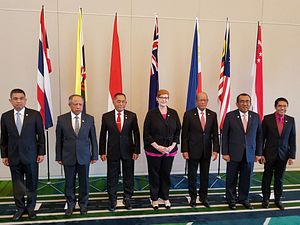Last week, Australia hosted six Southeast Asian countries for the inaugural iteration of a subregional defense ministers’ meeting on counterterrorism in Perth. The Perth Meeting represents just the latest iteration of evolving subregional cooperation around security issues in the region in general as well as deepening collaboration between Australia and ASEAN counties on counterterrorism in particular.
As I have been noting in these pages, over the past few years, the threat of the Islamic State has heightened fears in the Asia-Pacific about terrorism but also catalyzed regional cooperation at the bilateral, multilateral, and minilateral levels (See: “What Did the New Asia Terrorism Meeting in Indonesia Achieve?”). Indeed, there have been a host of subregional meetings already held on security issues, be it around trilateral cooperation on the Sulu-Sulawesi Seas between Indonesia, Malaysia, and the Philippines, or counterterrorism more generally with the new “Our Eyes” initiative, which was initially pursued between Brunei, Indonesia, Malaysia, Singapore, Thailand, and the Philippines (See: “What’s Next for the New ASEAN ‘Our Eyes’ Intelligence Initiative?”).
Australia has been part of this ongoing cooperation as well. We have seen various public manifestations of this over the past few years, from Canberra’s role in providing assistance to the Philippine military following the siege by Islamic State-backed militants in the southern city of Marawi to its role in tackling counterterrorism financing in concert with other key countries like Indonesia. The fact that Australia will hold a separate side event on terrorism as part of the inaugural ASEAN-Australia summit next month is testament to the importance it placed on the issue (See: “What’s Behind the First ASEAN-Australia Special Summit?”).
Last week, we witnessed yet another example with the holding of the inaugural Subregional Defense Ministers’ Meeting on Counterterrorism in Perth. Ahead of the meeting, the Australian defense ministry had framed the Perth Meeting around the need for a more collective response to enhance regional counterterrorism cooperation given the rising threat.
From February 1-2, Australia hosted the Perth Meeting, which was attended by Australian Defense Minister Marise Payne along with defense officials from six Southeast Asian countries, namely: Brunei Second Minister of Defense Pehin Dato Haji Halbi bin Mohd Yussof, Indonesian Defense Minister Ryamizard Ryacudu, Malaysian Deputy Minister of Defense HE Dato’ Sri Mohd Johari bin Baharum, Philippine Defense Secretary Delfin Lorenzana, Singapore Senior Minister of State for Defense Dr. Mohamad Maliki bin Osman, and Thailand Deputy Minister of Defense General Chaichan Changmongkol.
During the meeting, the countries discussed ongoing developments related to the terrorism threat as well as recent efforts taken to address them, be it maritime counterrorism initiatives like the the trilateral patrols underway in the Sulu-Sulawesi Seas or intelligence-sharing with the future direction of the Our Eyes initiative, which is set to expand even further (all six countries attending the Perth Meeting were members of the initiative).
Though the Perth Meeting has been billed a step forward for ASEAN-Australia ties, the future of the new subregional forum remains to be seen. On the upside, Indonesia has already committed to hosting the next iteration of the meeting in 2019, and upcoming engagements, including a meeting on terrorism at the upcoming ASEAN-Australia summit next month, offer opportunities to build on that cooperation.
But as we have repeatedly seen with the alphabet soup of already existing institutions in the Asia-Pacific, the evolution of forums tied to specific challenges tends to be contingent on various factors, including progress in other related forums, the level of comfort among members, and the direction of the very threats they are seeking to address.






























